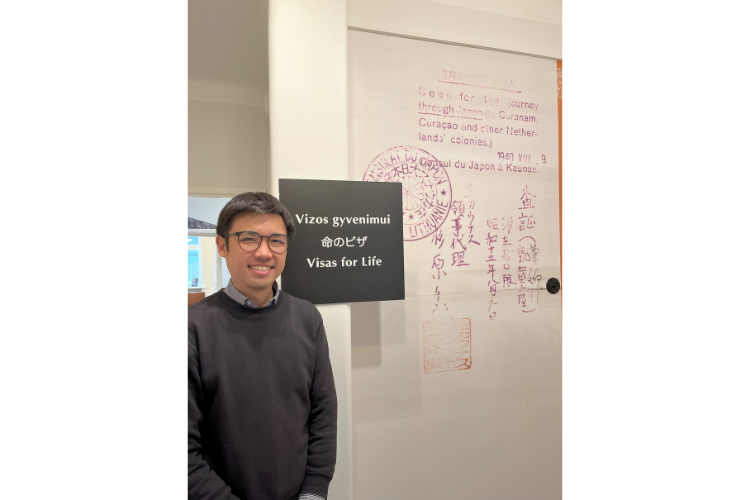Emory Graduate Student Pursues Research in Lithuania

I am deeply grateful to the Tam Institute for Jewish Studies for awarding me a Summer Graduate Grant to pursue my research interests. With the help of the Tam Institute’s research award, I have had the chance to visit and conduct research on a number of different Jewish communities around the world. I am extremely interested in the interactions between Jewish and Asian communities especially during World War 2; the topic that I will be focusing on in this article is the Japanese diplomat, Chiune Sugihara, who was the Japanese Consul in Kaunas, Lithuania, and saved thousands of Jews by issuing them visas to leave Europe.
I first came across Chiune Sugihara in my research when I visited Vienna and went to the exact site where a Chinese diplomat, Ho Feng-Shan, issued visas for Jews to escape Europe during the Second World War. I had previously come across stories of Jews being thankful to those who issued them visas to save their lives so I wondered if there were other Righteous Among the Nations like Ho Feng-Shan. And then I found Chiune Sugihara and learned that the very building that functioned as the Lithuanian Japanese consulate where he issued life-saving visas still exists, and it has now been converted into a museum and historical archive!
Being proficient in Japanese, I decided to go to Kaunas, where the former consulate is located, to do research in person. As I walked around Kaunas with a map looking for the building, an elderly gentleman approached me to ask if I needed help. He turned out to be a professor and was fascinated that I came all the way to Kaunas to see the consulate. He went on to tell me that most people in Lithuania know about Sugihara’s act of helping Jewish people but not many people have visited the exact location. He then accompanied me as we walked to the museum while we discussed Lithuanian Jewish history.
Upon arrival at the museum, it was like a historian’s dream come true to see the exact place where the life-saving visas were given out, the exact gate where the Jewish refugees waited outside the consulate (written on the gate in Japanese: The Gates of Hope, Visas for Life), the exact room where Sugihara issued the visas. Additionally, there was much archival material that was preserved in the form of postcards, photos, and letters, among other objects and documents.
Two lines that struck me hard were Sugihara’s statement about helping the Jewish refugees, that “They were human beings and they needed help. I'm glad I found the strength to make the decision to give it to them.” And Sugihara’s wife’s statement, that “I encouraged my husband to issue the visas, even though I knew it might jeopardize his career and even our lives. We knew that Jewish refugees were in peril for their lives. Human life is the most precious thing.” These capture the essence of Mr. and Mrs. Sugihara’s magnanimity and their view that every single human life is valuable, even at a time when acting on this belief may have put their own lives in danger.
I got a chance to speak with some members of the Jewish community at the museum and learned that it was badly affected by COVID (very few international visitors) and is lacking in funding and publicity. Not many people know about the museum, especially overseas. Hopefully, this will change as knowledge about this small but important museum spreads and international travel resumes to pre-COVID levels. I myself hope to be able to go back one day to contribute to the museum and to speak with the remaining members of the small Jewish community in Lithuania. I also came to know that other archival materials have been preserved in the Kaunas Regional State Archives and the Central State Archives of Lithuania; a future trip would allow me to gain even more insight there. There is so much more that we do not know about Chiune Sugihara, the Kaunas and Lithuanian Jewish community, and their fascinating and important history that I hope to play a part in making more known to the world.
Published 2/25/25